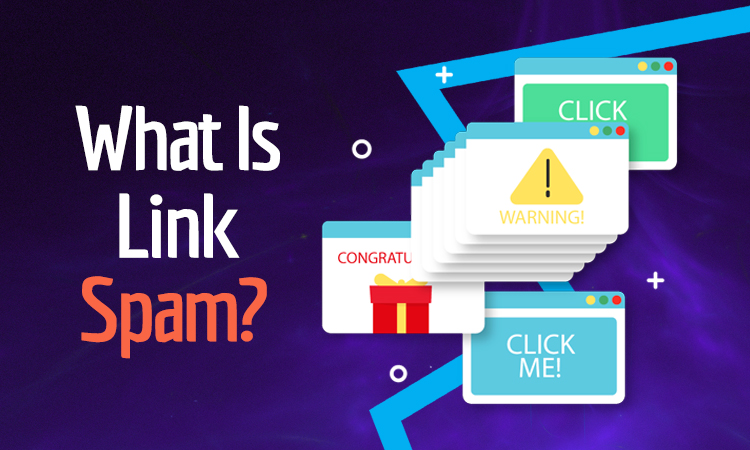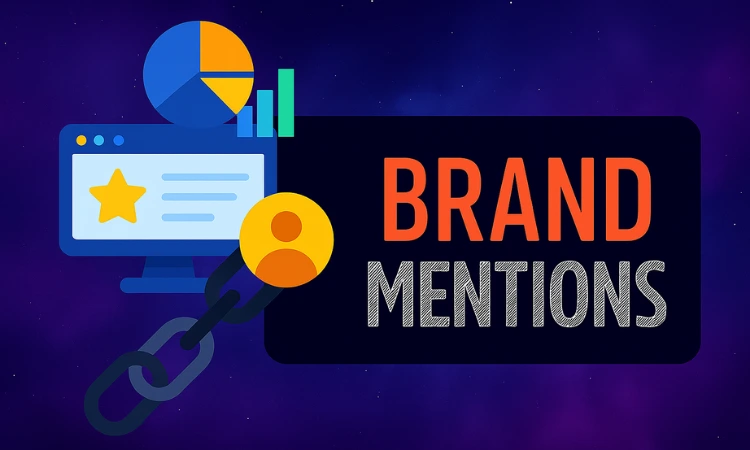Link spam refers to practices that manipulate search engines into giving higher search rankings by artificially creating links that point to a target website.
Because search rankings are in part based on the number of links pointing to a website, link spam deceives the search engine into believing that the target website is what the user seeks, unethically improving the site’s search engine visibility.
What Does Link Spam Look Like?
Link spamming takes many different forms. Methods such as comment spam, link farms, low-quality paid links, blog feed directories, and other link spamming tactics are employed to achieve their insidious goals despite Google updating its algorithms and imposing link spam penalties to fend off this threat.
As we delve into the intricate web of link spam, let’s uncover its deceptive tactics and unravel the strategies to safeguard our online domains.
Reasons for Link Spam
Link spamming is either intentionally done to manipulate search engines or happens to you without your knowledge or direct involvement, as we will explore below.
-
To Artificially Boost a Website’s Search Engine Rankings
Search engine rankings are assigned based on the number and quality of links directed to a website. If a handful of links point to a particular website, the search engine could rank it higher.
This is because the page will have more link equity, commonly called “link juice“.
What link spam does is that it feeds on artificially created, low-quality links that unethically force web browsers to rank the target website higher.
-
To Drive Unsuspecting Traffic to Malicious Sites
Cybercriminals often create link spam to direct you to malicious sites or phishing scams, endangering your personal and financial information. They may disguise spam links as legitimate e-commerce sites or trusted institutions.
Although these links might look harmless, they are designed to steal data with just one click. One common tactic, “tabnabbing,” exploits security vulnerabilities in the linking site to execute this theft.
-
To Falsely Increase Perceived Site Authority
Accumulating more links can artificially boost a website’s perceived authority—and thus its search engine ranking.
This is because Google views links as endorsements of a website’s credibility and relevance. However, not all link-building practices are beneficial or ethical.
Types of Link Spam
There is no shortage of spammy websites, link schemes, or other link manipulation opportunities. Here are a few of the most common ones, though.
1. Comment Spam in Blogs and Forums
Comment spam is a standard method spammers use to sneak links into blogs and forums. These links often redirect to the spammer’s clients’ sites.
Exploiting these platforms’ interactive and trusting nature, spammers use automated tools or manually insert seemingly innocuous comments packed with hidden links.
2. Automated Bots for Posting Links
Automated bots are particularly effective for spammers due to their ability to quickly post large volumes of generic comments.
These bots are programmed to mimic human interactions, dropping spam links in comments that lead users to malicious sites or irrelevant pages.
3. Manual Posting of Irrelevant Links
Spammers also manually post links in high-traffic articles and blogs.
They cleverly craft comments with irrelevant links, skillfully blending them into legitimate discussions to divert traffic to their targeted sites.
4. Hidden Text and Links
Another sneaky tactic is embedding hidden text or links in web pages.
Spammers use small font sizes or text the same color as the background to hide links and keyword-stuffed text, which can manipulate search rankings but are invisible to site visitors.
5. CSS Manipulation
Spammers often use CSS to position text off-screen or behind images, making the text invisible to users but still detectable by search engines.
This technique helps them stuff keywords and links without affecting the visual user experience.
6. Spammy Backlink Profiles
Websites with spammy backlink profiles are often penalized by search engines.
These profiles typically have a high volume of links from dubious sources, with repetitive anchor texts and a sudden spike in link acquisition, indicating manipulative practices.
7. Purchased Backlinks and Link Farms
Buying backlinks from link farms is a risky strategy.
These farms create networks of low-quality sites designed to boost SEO through volume rather than value, which can lead to search engine penalties and damage to your site’s reputation.
8. Link Exchanges Between Non-Relevant Sites
Reciprocal linking between sites that aren’t topically related can dilute your site’s relevance and degrade the user experience.
While link exchanges can be beneficial, they should be between sites that offer related content and genuine value to each other’s audience.
Consequences of Link Spam
Suffice it to say nothing good comes from link spam. Here are some of the ways spam links can be damaging.
-
Penalization by Search Engines
Search engines like Google enforce strict guidelines to discourage practices such as link spam. They use advanced algorithms to detect violations.
Non-compliance can lead to severe penalties, ranging from lower rankings to de-indexing, a penalty in which the offending website is completely removed from search engine results.
-
Google’s Penguin Algorithm Update
Launched in April 2012, Google’s Penguin update targets websites engaged in manipulative link-building practices. It focuses on identifying spammy backlinks acquired through deceptive tactics.
With Penguin 4.0, penalties became more granular, reducing the broader impact of link spam on websites while still penalizing the specific offending parts.
-
Damage to Website Reputation
Link spam can severely damage a website’s reputation. Engaging in such practices tarnishes credibility and trust, leading to negative perceptions among users and potential business partners.
This reputational damage can diminish a website’s survival chances, impact SEO rankings, and lead to further legal and regulatory consequences.
-
Loss of User Trust
Encountering spammy links can erode users’ trust. Users may be disappointed and mistrustful When they expect credible content but find manipulative links instead.
Adverse experiences may be shared on social platforms, damaging the website’s reputation.
-
Hesitation from Legitimate Sites
Legitimate websites hesitate to link to or associate with sites penalized for link spam. They prioritize relevancy, authority, and integrity, avoiding any association that could harm their standing.
-
Increased Vulnerability to Cyber Threats
Spammy links can increase users’ exposure to malware and phishing attacks. These links may lead to sites that host malware, like ransomware or spyware, or phishing sites that mimic legitimate operations to steal sensitive information.
-
Direct Threats from Malicious Links
Clicking on spammy links can automatically download malicious files, compromising user safety.
This can result in identity theft, unauthorized control of user devices, or using such devices for illegal activities like DDoS attacks and ransom demands.
-
Phishing Sites Posing as Legitimate Entities
Phishing sites exploit the guise of legitimacy to trick users into divulging sensitive information.
They distribute links through emails, social media, and messaging platforms, which appear from trusted sources but are designed to steal personal data and commit financial fraud.
Prevention and Mitigation of Spam Links
Most sites have at least some low-quality links; most of the time, these happen naturally, not as part of an elaborate link manipulation scheme.
No matter how they got there, here is how to deal with them.
-
Regularly Auditing and Cleaning Up Spammy Links
Since link spamming isn’t going away anytime soon, you must know how to differentiate quality links from their spammy counterparts and what to do once you identify them.
-
Importance of Periodic Backlink Audits
Regularly auditing your backlink profile is crucial for maintaining the relevance and integrity of your website’s SEO strategy.
Search engines like Google penalize websites that have poor-quality backlink profiles, which can lead to lower search rankings.
-
Benefits of Regular Website Audits
By conducting routine website audits, you can ensure your backlinks originate from credible sources, which helps avoid penalties.
Regular audits also improve user experience, ensure compliance with search engine policies, and protect your site against negative SEO tactics.
This proactive approach enhances your website’s standing and strengthens its defense against harmful links.
If you aren’t yet able to partner with an agency, here are some tools that can help you start the audit and cleanup process.
Tools for Identifying Link Spam
The quality of backlinks is a vital indicator of a website’s integrity, relevance, and authority. Maintaining a healthy backlink profile is essential to meet search engine standards and safeguard your SEO.
Here are some tools to help you manage this:
-
Google Search Console
Google Search Console allows you to monitor and evaluate your backlink profile directly from Google’s perspective. It provides detailed insights into which sites link to you and how these links affect your SEO performance. This tool is vital for identifying and addressing harmful links quickly, ensuring your link architecture supports rather than hinders your search engine rankings.
GSC Guide: For a deeper understanding, refer to our comprehensive guide to Using Google Search Console for Keyword Research, which also covers backlink management.
-
Ahrefs
Ahrefs is renowned for its exhaustive backlink analysis capabilities. It provides detailed insights into domain authority, spam scores, and linking domains. This tool helps you assess the strengths and risks within your backlink profile, making it easier to identify link spam and rectify potentially damaging links.
Ahrefs updates its link database in near real-time, ensuring you can always access the most current data on your backlinks.
-
Link Research Tools
Link Research Tools is a software tailored for link audit and recovery work. It is designed to help you thoroughly clean your backlink profile and recover from penalties by identifying and removing harmful links.
This tool stands out by aggregating data from multiple sources, giving you a comprehensive view of your backlink landscape and a scoring system to help you identify link spam and other high-risk links.
Stellar SEO: Expert Services Over DIY
Opting for professional SEO services like Stellar SEO can provide more substantial benefits than attempting to manage SEO and link audits independently.
With over a decade of experience in expert link building, penalty recovery, and audit services, Stellar SEO delivers customized solutions that tackle the unique challenges of link spam head-on.
Why Choose Us?: Our services are tailored to restore and enhance your site’s SEO integrity, ensuring long-term success and stability in your rankings. We provide a strategic partnership that extends beyond basic link cleanup, supporting your ongoing SEO efforts and helping you achieve sustained results.
Time To Join The Fight Against Link Spam
In the complex and ever-evolving digital landscape, link spam remains a pervasive threat, casting a shadow over website integrity. It jeopardizes the trust and authority of your online presence and poses significant risks to your search engine rankings.
However, these challenges are not insurmountable with the proper knowledge and tools.
Employing tools like Google Search Console, Ahrefs, and Link Research Tools can effectively monitor and cleanse your backlink profile of harmful links.
Opting for professional services like Stellar SEO offers a strategic advantage for those seeking comprehensive and lasting results.
Embrace the opportunity to safeguard your website against link spam. Stand firm in the digital arena where authenticity and value reign supreme, ensuring that every link enhances, rather than compromises, your site’s credibility.
















